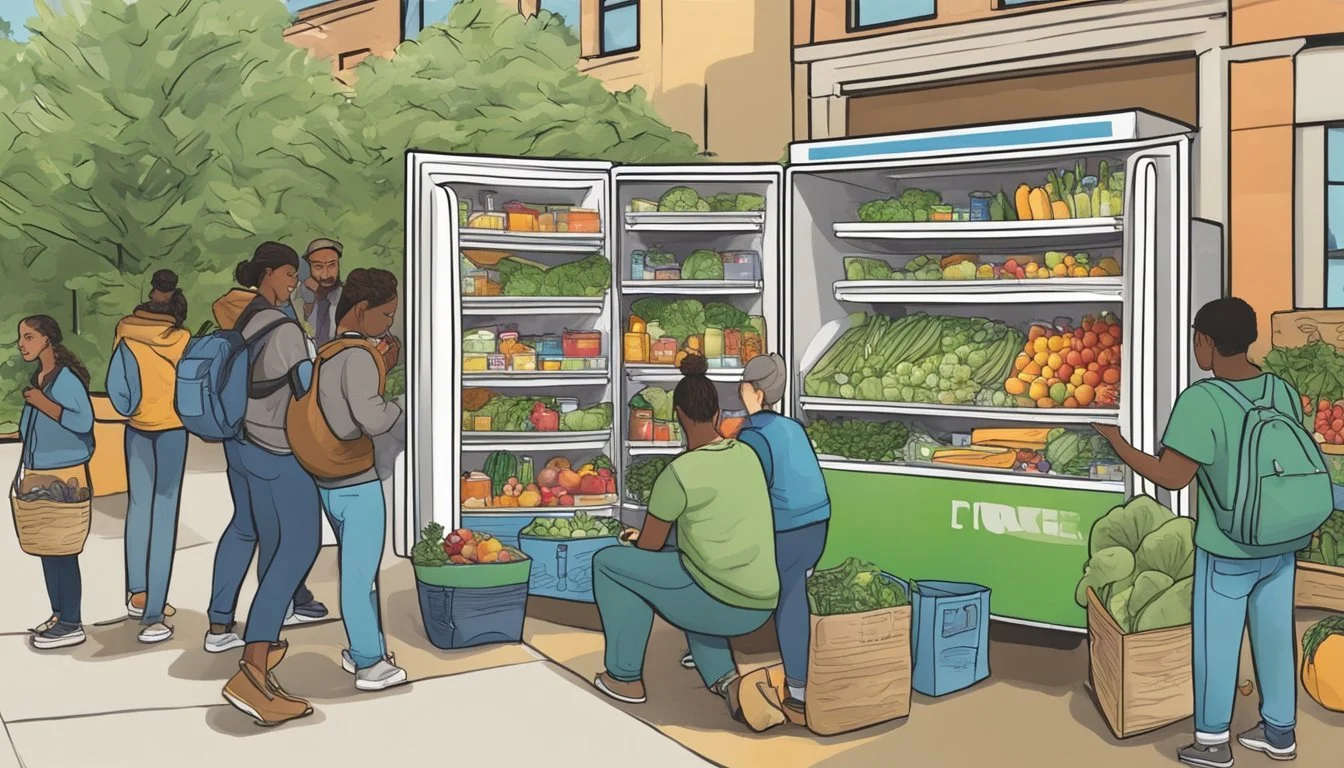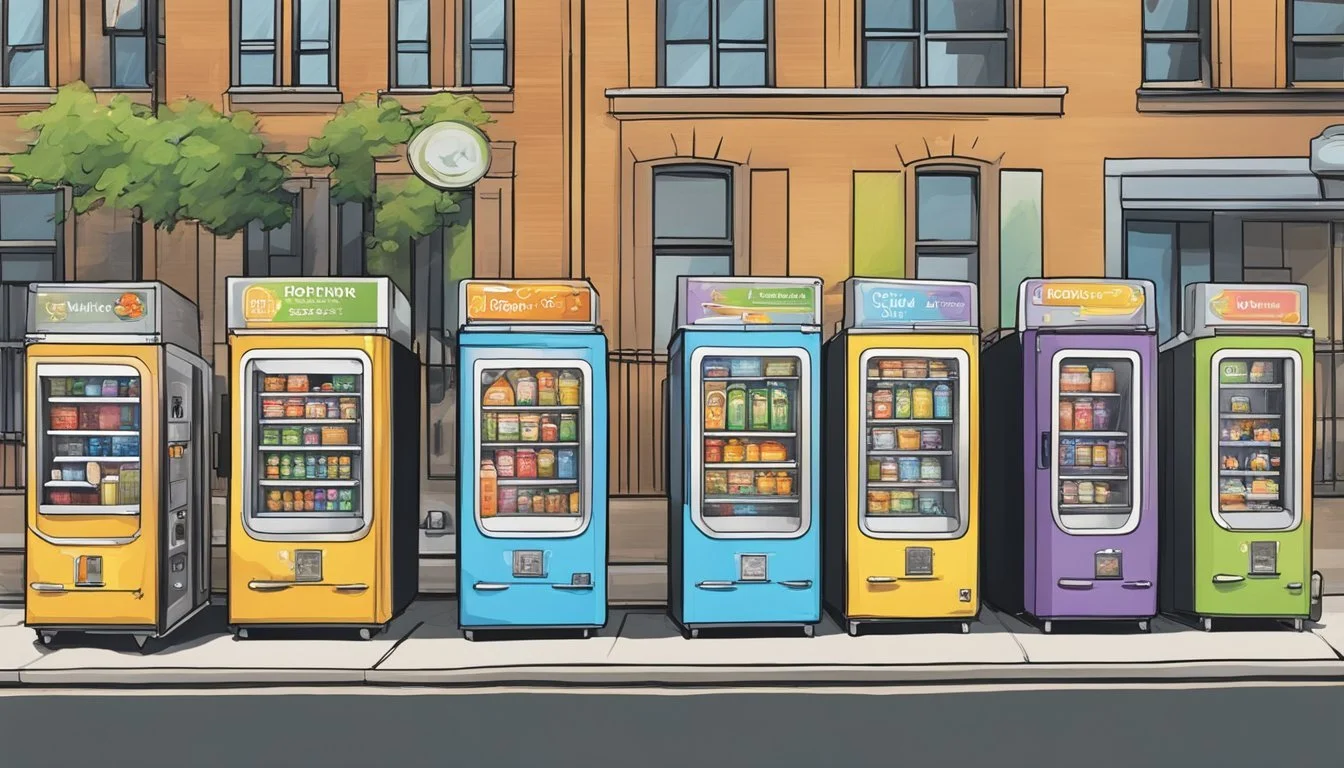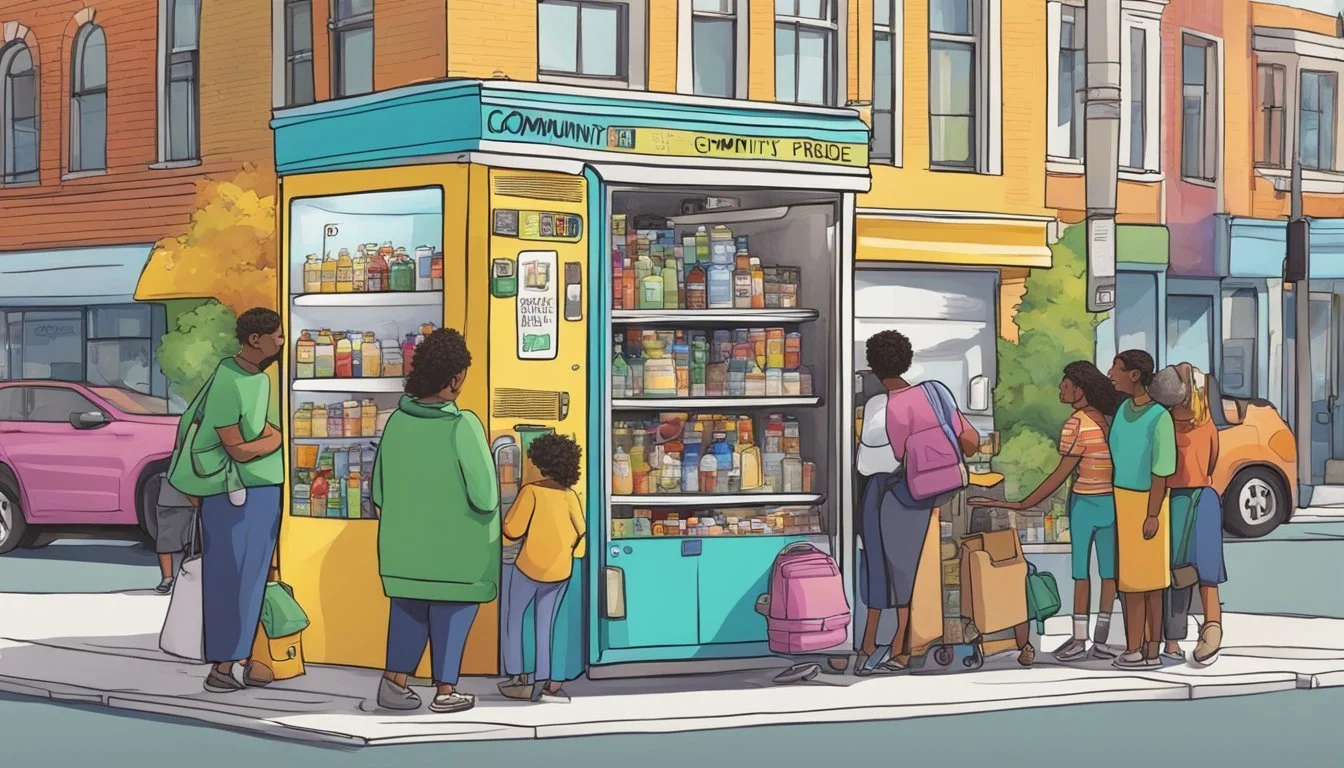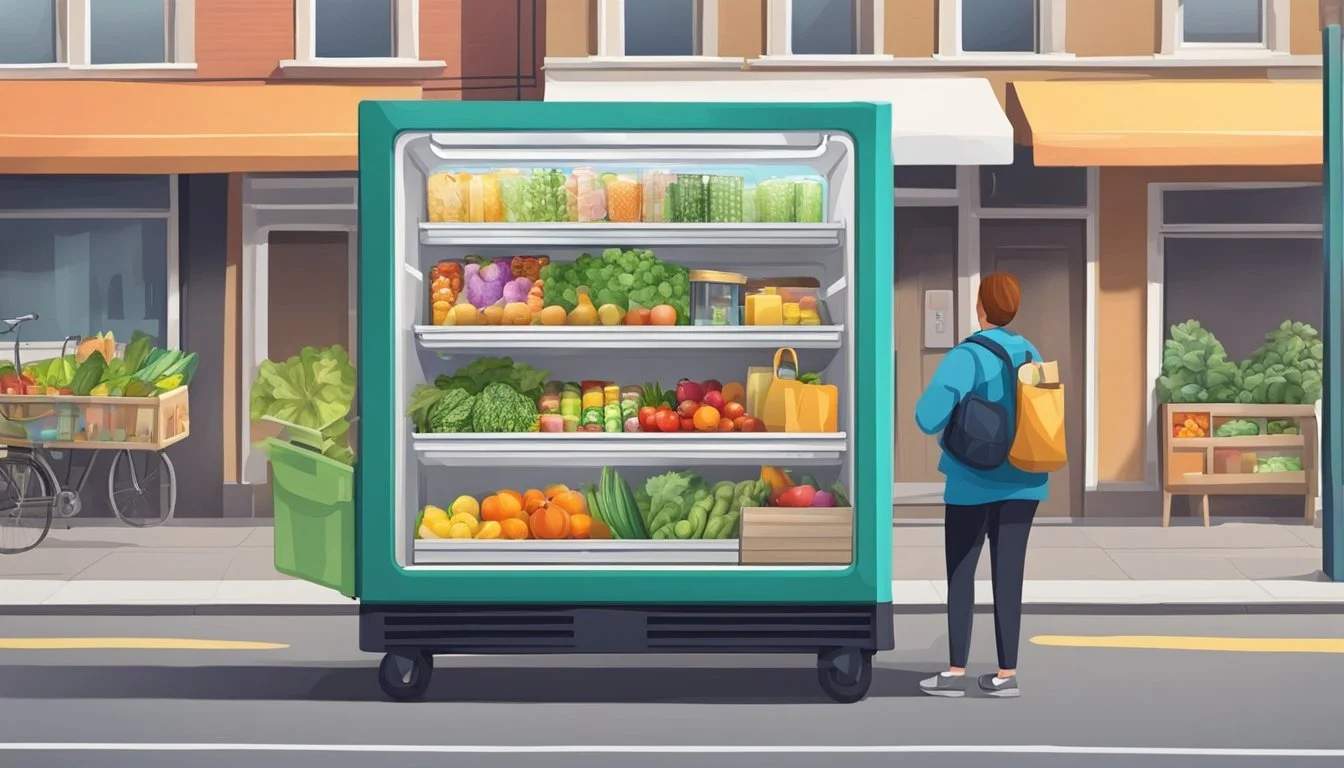Madison, WI Community Fridge
Nourishing Neighbors with Shared Resources
Madison Community Fridges is a grassroots initiative aimed at tackling food insecurity and reducing food waste in Madison, Wisconsin. The project harnesses the power of mutual aid to provide free, fresh food to those in need. Rooted in the community, the program operates through a network of refrigerators strategically placed throughout the city, making nutritious food accessible to everyone.
The concept functions on a simple take-what-you-need, leave-what-you-can premise. Residents and local businesses contribute to the fridges, stocked with fresh produce and other perishable goods. This collaborative effort not only addresses immediate needs but also fosters a sense of community solidarity and support.
However, this innovative approach to community support has not been without its challenges. City officials shut down one of the fridges after receiving an anonymous complaint, underscoring the regulatory hurdles faced by such community-led movements. Despite this, Madison Community Fridges persists, embodying the spirit of collective responsibility and emphasizing the importance of local solutions in the broader fight against hunger.
History and Mission
Community fridges have emerged as a powerful tool to combat food insecurity and minimize food waste through the practice of mutual aid. In Madison, Wisconsin, the community fridge movement saw significant growth amidst a global pandemic, propelled by local grassroots efforts.
Origins of Community Fridges
Community fridges, often part of a larger national grassroots campaign, are public refrigerators that offer free food to anyone in need. The concept is rooted in the sharing economy and mutual aid, allowing communities to provide for themselves and reduce food waste in an accessible manner. Over time, these fridges have become a symbol of community support and a practical response to immediate needs.
Madison Community Fridge Movement
The Madison Community Fridges initiative began in 2020 during the challenging times of a pandemic. Local residents, many from the Tenney-Lapham neighborhood, and members of the grassroots group Madison Community Fridges, set up the first refrigerator on the lawn at 1005 East Johnson Street. Volunteers, including those who work at nearby farms, have since maintained and stocked the fridge regularly.
Goals and Principles
The goals of Madison Community Fridges are clear:
Combat food insecurity: Provide consistent access to free, fresh food for community members facing tough times.
Reduce food waste: Encourage the donation of surplus food, thus lessening the impact of food waste on the environment.
The principles that drive the movement are centered on mutual aid and community empowerment. By instilling a sense of collective responsibility and sustainability, Madison Community Fridges aims to nourish its community both physically and socially.
Madison's Community Fridge Locations
Madison Community Fridges operates several fridges throughout the city, providing fresh food to the community and aiding those facing food insecurity. They are maintained by volunteers and are situated in key locations for easy public access.
East Johnson Street Fridge
The first fridge is located on 1005 East Johnson Street, near the intersection with Brearly Street. It's known for being regularly stocked with fresh produce, much of which comes from workers at Troy Farm who live in the vicinity.
Tenney-Lapham Neighborhood Fridge
In the Tenney-Lapham neighborhood, a fridge can be found offering free food at the Social Justice Center on Willy Street, although the Madison Community Fridges prefers having a fridge located within the neighborhood's vicinity for easier access to the residents.
Mills Street Fridge
Further information regarding a fridge on Mills Street was not explicitly mentioned in the search results provided. Therefore, it cannot be confirmed as a current location within the Madison Community Fridges network.
Operational Guidelines
The Madison Community Fridge operates with strict protocols to ensure food safety and maintain a dignified experience. Volunteers are central to the project's success, committing to routine tasks, including monitoring and cleaning.
Safety and Sanitation Protocols
Madison Community Fridge prioritizes safety and adheres to strict sanitation practices. The fridge maintains a temperature between 32-40°F, while the freezer remains at or below 0°F to ensure proper food preservation.
Regular Cleaning:
Volunteers are provided with cleaning supplies to conduct daily upkeep.
Surfaces are sanitized to prevent contamination.
Spoiled items are removed promptly, maintaining pride in the service provided.
Maintenance and Volunteer Involvement
The maintenance of the fridge is a community effort spearheaded by dedicated volunteers.
Volunteer Duties:
Inspect and record temperature readings multiple times a day.
Restock and organize the fridge contents for easy access.
Engage in community outreach to uphold the fridge's purpose and values.
Volunteers take pride in nurturing their community, ensuring the fridge operates smoothly and upholds the dignity of all who utilize it.
Community Impact
The Madison Community Fridge initiative positions itself as a significant agent for change within local neighborhoods through food sharing, reducing waste, and enhancing food security.
Supporting Neighborhoods
The initiative bolsters communal relationships by providing neighbors with direct access to free food. Volunteers from the community, including residents who work at nearby farms, regularly stock the fridges to support their neighbors, particularly during economic hardships. This fosters a sense of solidarity and mutual aid within Madison.
Environmental Benefits
In addition to supporting individuals, the refrigerators play a role in environmental stewardship. They help reduce food waste by distributing excess fresh produce that might otherwise be discarded. This not only alleviates the economic hit of food waste but also contributes positively to environmental conservation efforts by the community.
Addressing Food Insecurity
Madison Community Fridges directly confront food insecurity by ensuring that healthy food is accessible to all, irrespective of socioeconomic status. The refrigerators operate as part of a larger mission to reduce hunger in the area, serving as a dependable source of nourishment for those facing food scarcity, thereby impacting public health and well-being across the community.
Legal and Zoning Considerations
In Madison, Wisconsin, the establishment and operation of community fridges are subject to specific legal statutes and city zoning ordinances. Compliance with these regulations is essential to ensure their continual service to the community.
Permits and Zoning Restrictions
Community fridges in Madison are governed by city zoning laws and building codes, which dictate where they can be located and the manner in which they are constructed. For example, the placement of a fridge may be limited by local property use categories. A shed or enclosure built to house a community fridge, for instance, may require permits to ensure adherence to safety and design standards set by the City of Madison.
Dealing with City Citations and Complaints
When a community fridge is reported for not complying with legal requirements—such as being in the wrong zoning class or not meeting health and safety regulations—the city issues citations. Following an anonymous complaint, city officials deemed a community fridge on the 1000 block of E Johnson to be in violation of zoning ordinances. Resolving such issues typically involves the fridge operators meeting with city officials to discuss relocation or cessation of operations.
Partnerships and Outreach
Madison Community Fridge thrives through strategic partnerships and active community engagement, ensuring that fresh food is accessible to all.
Collaborations with Local Food Pantries
The Madison Community Fridge has established vital connections with local food pantries such as The River Food Pantry to foster a system of mutual support. These collaborations typically involve the sharing of supplies and resources to combat food insecurity. A symbiotic relationship enables the fridge to be stocked with a variety of fresh and nutritious food options.
Engaging with the Greater Community
A key host in the Madison network is the Neighborhood House, which aligns with the community fridge's goals of aiding those in need. Spearheading efforts to engage various sectors of Madison, the initiative reaches out to neighborhoods, rallying local residents and businesses to contribute and uphold the spirit of mutual aid.
Challenges and Resilience
Madison's Community Fridges have emerged as a critical resource in the fight against food insecurity, displaying remarkable resilience despite facing obstacles. These public refrigerators rely on the principle of "take what you need, leave what you can," fostering a sense of collective responsibility.
Facing Wisconsin Winters
Wisconsin's harsh winters present a significant challenge for Madison Community Fridges. Volunteers are pivotal in ensuring that the refrigerators remain functional and accessible amidst snow and freezing temperatures. Efficient strategies, such as proactive maintenance and weatherproofing measures, must be implemented to prevent food from freezing and maintain a steady supply for those in need.
Strategies Employed:
Routine checks: Volunteers conduct frequent inspections to assess the condition of the refrigerators.
Weatherproof structures: Protective shelters have been constructed around the refrigerators to guard against the winter elements.
Managing Supply and Demand
Volunteers also confront the task of managing the delicate balance between supply and demand. With the community's needs varying, maintaining a consistent stock of fresh, nutritious food is essential. The model depends on community participation, and at times, the fridges have faced shortages or surpluses that required rapid response. Despite these fluctuations, the refrigerators remain steadfast in their mission, supported by community donations and the tireless efforts of the volunteers.
Balancing Tactics:
Inventory tracking: Regular monitoring of stock levels helps in matching donations with demand.
Community engagement: Outreach programs encourage local residents and businesses to contribute as per the current needs.
The project has faced hurdles such as anonymous complaints, targeting the legality of the fridges' location. In response, supporters of Madison Community Fridges have been working within the framework of local regulations to find solutions that ensure the continuation of this vital service.
Expansion and Future Plans
As the Madison Community Fridges project experiences growth, a strategic focus on finding new locations for fridges and ensuring the long-term sustainability of the initiative is vital.
Finding New Homes for Frididges
The project team seeks new homes for community fridges to facilitate expansion into more neighborhoods. They prioritize accessible locations with high visibility to maximize community impact. The initiative parallels efforts seen in the larger cities like New York City and Milwaukee, aiming to alleviate food insecurity through communal sharing.
Long-Term Sustainability
For sustainability, the Madison Community Fridges project relies on consistent donations and volunteer support. The team is focused on creating robust systems for food collection and distribution that can operate efficiently year-round. Through careful planning and community involvement, the project aims to establish a sustainable presence in Madison.
How to Get Involved
The Madison Community Fridges initiative offers various avenues for individuals to contribute to their mission of combating food insecurity. It relies on a strong grassroots community effort and encourages participation through volunteering and donation programs.
Volunteering Opportunities
Madison Community Fridges relies on dedicated volunteers to maintain and stock the fridges. Those looking to offer their time can engage in:
Fridge Maintenance: Ensuring fridges are clean and in good working condition.
Food Sorting and Stocking: Organizing and placing food items in the fridges while checking for food safety.
Volunteers can reach out directly to the Madison Community Fridges organization to learn about volunteering schedules and specific roles that need to be filled.
Donation Programs
Supporting the initiative can also be done through donations, which are critical for continuous operation. The program accepts:
Food Donations: Fresh produce and unexpired food items can be placed directly in the community fridges.
Monetary Donations: Funds are used for fridge upkeep and to purchase additional supplies as needed.
To donate supplies or funds, individuals can contact the organization or visit specific drop-off points around the community. For monetary contributions, Madison Community Fridges often facilitates online donation platforms, such as GoFundMe, where individuals can contribute electronically.
Success Stories and Testimonials
The Madison Community Fridge initiative showcases its effectiveness through powerful real-life stories and the heartfelt experiences of those it serves. These testimonials epitomize the pride and success tied to the project's impact on the community.
Impactful Anecdotes
Community Involvement: A local artist contributed to the aesthetic and visibility of the first fridge by painting it, which sparked greater community engagement.
Mutual Aid Success: Reports indicate that within a month of its founding, the fridge, conceived as a mutual aid effort, saw consistent use, indicating its immediate benefit to the community.
Community Members' Experiences
Local Resident: One Tenney-Lapham resident shared their sense of pride in the community's responsiveness, noting how neighbors quickly mobilize to restock the fridge with fresh produce.
User Testimonial: A frequent user of the fridge expressed gratitude, stating that the availability of fresh food has been a substantial relief during tough economic times.











